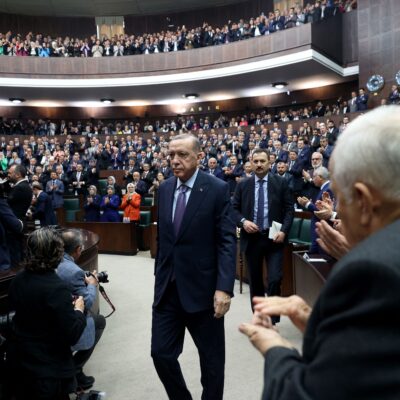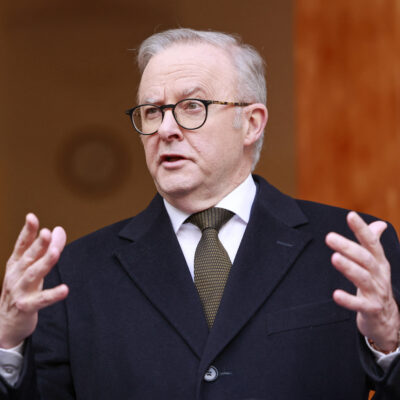
Daily Kickoff: Democrats shift on Israel
Good Tuesday morning.
In today’s Daily Kickoff, we report on the White House’s warnings to Israel over humanitarian aid, and explore what Israel’s military withdrawal from parts of Gaza means for its broader war objectives. Also in today’s Daily Kickoff: Rep. Josh Gottheimer, U.K. Foreign Secretary David Cameron and Bradley Tusk.
Vice President Kamala Harris is slated to meet today in D.C. with the family members of some of the remaining 133 hostages; the group met yesterday with National Security Advisor Jake Sullivan, Deputy Treasury Secretary Wally Adeyemo and Brian Nelson, the under secretary of the treasury for terrorism and financial intelligence, as top American, Israeli, Qatari and Egyptian officials work toward an agreement that would secure the release of some of the hostages.
Harris’ meeting comes amid a noticeable shift among Democratic officials away from full-fledged support for Israel and its prosecution of the war against Hamas, Jewish Insider Editor-in-Chief Josh Kraushaar writes.
First, the Biden administration has been putting increased pressure on Israel over the last month, a subtle shift that began around the president’s March State of the Union address, which in its Middle East section focused extensively on criticizing Israel’s war conduct. The administration abstained, instead of vetoing, a United Nations Security Council resolution calling for a cease-fire in Gaza without making the cease-fire contingent on Hamas releasing Israeli hostages — a clear policy shift.
And after Israel’s accidental attack against a World Central Kitchen convoy, which killed seven humanitarian aid workers, the Biden administration further amped up the pressure on the Jewish state — leading Israel to open up additional humanitarian corridors, followed by a troop withdrawal from southern Gaza. These days, it’s much more common to hear Biden administration officials express their frustrations publicly with Israel — and less common to hear any public pressure from the U.S. on Hamas or its benefactors.
On Monday, State Department spokesman Matthew Miller made clear that the Biden administration is ruling out an Israeli invasion of Rafah under any circumstances, raising doubts whether the U.S. still supports Hamas’ removal from power. “We have made clear to Israel that we think a full-scale military invasion of Rafah would have an enormously harmful effect on the civilians and then it would ultimately hurt Israel security. So it’s not just a question of Israel presenting a plan to us,” Miller said.
Second, a number of generally pro-Israel lawmakers have rolled back their once-solid support for the Jewish state.
Sen. Tim Kaine (D-VA) is now calling on the U.S. to “withhold bombs and other offensive weapons that can kill and wound civilians and humanitarian aid workers.” It’s a move that constrains Israel, even as it faces a growing threat from Iran and its Hezbollah proxy in the north.
Former House Speaker Nancy Pelosi (D-CA), a once-reliable ally of Israel, joined several dozen progressive House Democrats calling for a halt to arms transfers to Israel in a letter to Biden and Secretary of State Tony Blinken. Among the other 55 signatories to the letter: Squad-affiliated lawmakers including Reps. Rashida Tlaib (D-MI) and Alexandria Ocasio-Cortez (D-NY). The group also includes Appropriations Committee Ranking Member Rosa DeLauro (D-CT) and Rep. Jamie Raskin (D-MD).
Rep. Susan Wild (D-PA), facing a competitive reelection, said that the U.S. must directly investigate the WCK attack and seek accountability before she can support any further arms transfers to Israel.
Even Rep. Josh Gottheimer (D-NJ), one of the most stalwart supporters of Israel in the House and a potential New Jersey gubernatorial candidate in 2025, expressed concern last week of Israel over the WCK strike (while also praising the steps Israel has taken to pursue accountability for those involved). New Jersey’s likely future senator, Rep. Andy Kim (D-NJ), called for a permanent cease-fire after securing the Democratic nomination for the state’s Senate seat.
In a subsequent conversation with JI yesterday, Gottheimer pushed back on the shift in his own party, saying that the push to suspend and condition aid to Israel, which is supported by Pelosi, “emboldens Hamas.” More below.
The shift comes as U.S. officials — from the Biden administration to members of Congress — appear eager to engage with elements of the Israeli opposition. Israeli Opposition Leader Yair Lapid, in the U.S. this week, met with Blinken and Sullivan, as well as Sen. Ben Cardin (D-MD) yesterday, and will meet today with Senate Majority Leader Chuck Schumer (D-NY) — who last month called for new elections in Israel. Lapid will also meet with Sen. Lindsey Graham (R-SC) who flew to Israel to appear at Netanyahu’s side after Schumer’s remarks.
Meanwhile, progressive critics of Israel, emboldened by the softening Democratic support, have gone even further in their condemnations. Sen. Elizabeth Warren (D-MA), speaking at a Boston-area mosque last week, said said she thinks the International Court of Justice will determine Israel’s actions in Gaza legally constitute genocide. Sen. Chris Van Hollen’s (D-MD) anti-Israel posture has gotten so strident that the editorial board of Baltimore’s leading Jewish newspaper wrote the “time when we counted Van Hollen as a challenging but reliable friend of the Jewish community and the state of Israel” is “gone,” adding, “we face the uncomfortable reality that Chris Van Hollen is not our friend.”
Much of this movement is about internal Democratic politics. Nearly all Republicans remain strongly behind Israel, while plenty of leading Democrats — from Sen. John Fetterman (D-PA) to Sen. Jacky Rosen (D-NV) to Rep. Ritchie Torres (D-NY) and Gottheimer — remain rock-solid supporters of Israel. Most Democrats in competitive congressional races are reliably pro-Israel, a sign that overall public opinion remains behind the Jewish state.
But just as support for Ukraine gradually flagged among Republicans, amid unrest among the GOP base, we’re seeing a similar dynamic emerging among Democrats. And if Biden doesn’t maintain his own clear and principled defense of Israel that was evident in the aftermath of the Oct. 7 attacks, he risks giving the activist left outsized control of his administration’s foreign policy in the run-up to the 2024 election.
u.s. demands
Biden White House not satisfied with Israeli changes on Gaza: ‘We want to see much more’

Days after the White House warned Israel to change course on its policy in Gaza or face consequences from the United States, senior Biden administration officials reiterated that the threat still stands — and that early steps Israel took to remedy the humanitarian crisis are not enough to quell U.S. dissatisfaction, Jewish Insider’s Gabby Deutch reports.
Still watching: “We’ve seen them take initial steps here over the past few days, but we want to see much more,” State Department spokesperson Matthew Miller said at a press briefing on Monday. “We are going to be watching them over the coming days, the coming weeks, to see that the steps they have announced actually lead to improved results, and we will make assessments and make determinations of our policy based on those results.”
Early actions: Responding to the White House threat, which President Joe Biden relayed to Israeli Prime Minister Netanyahu in a call last Thursday, Israel announced several changes. Over the weekend, Israel agreed to open the northern Erez Crossing into Gaza and the Ashdod port to facilitate delivery of humanitarian aid, and to allow additional aid to enter through Jordan. On Sunday, over 300 aid trucks entered Gaza — the most of any single day since the war started — and on Monday, more than 400 trucks entered Gaza.
Good start: White House National Security Council spokesperson John Kirby called the 300 aid trucks that entered Gaza a “good start” but told reporters on Monday that “what matters is how it can be sustained over time.”


















































































